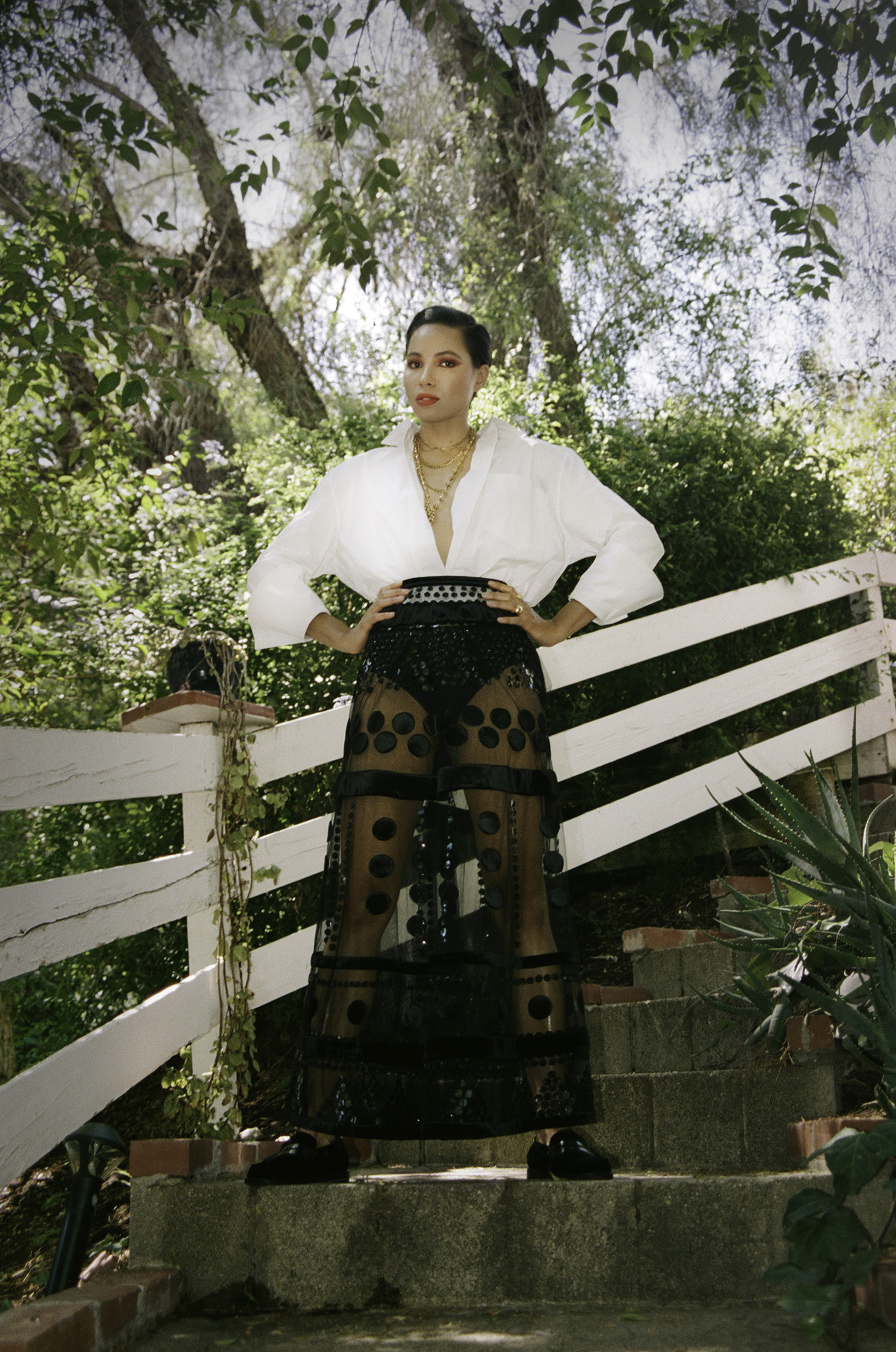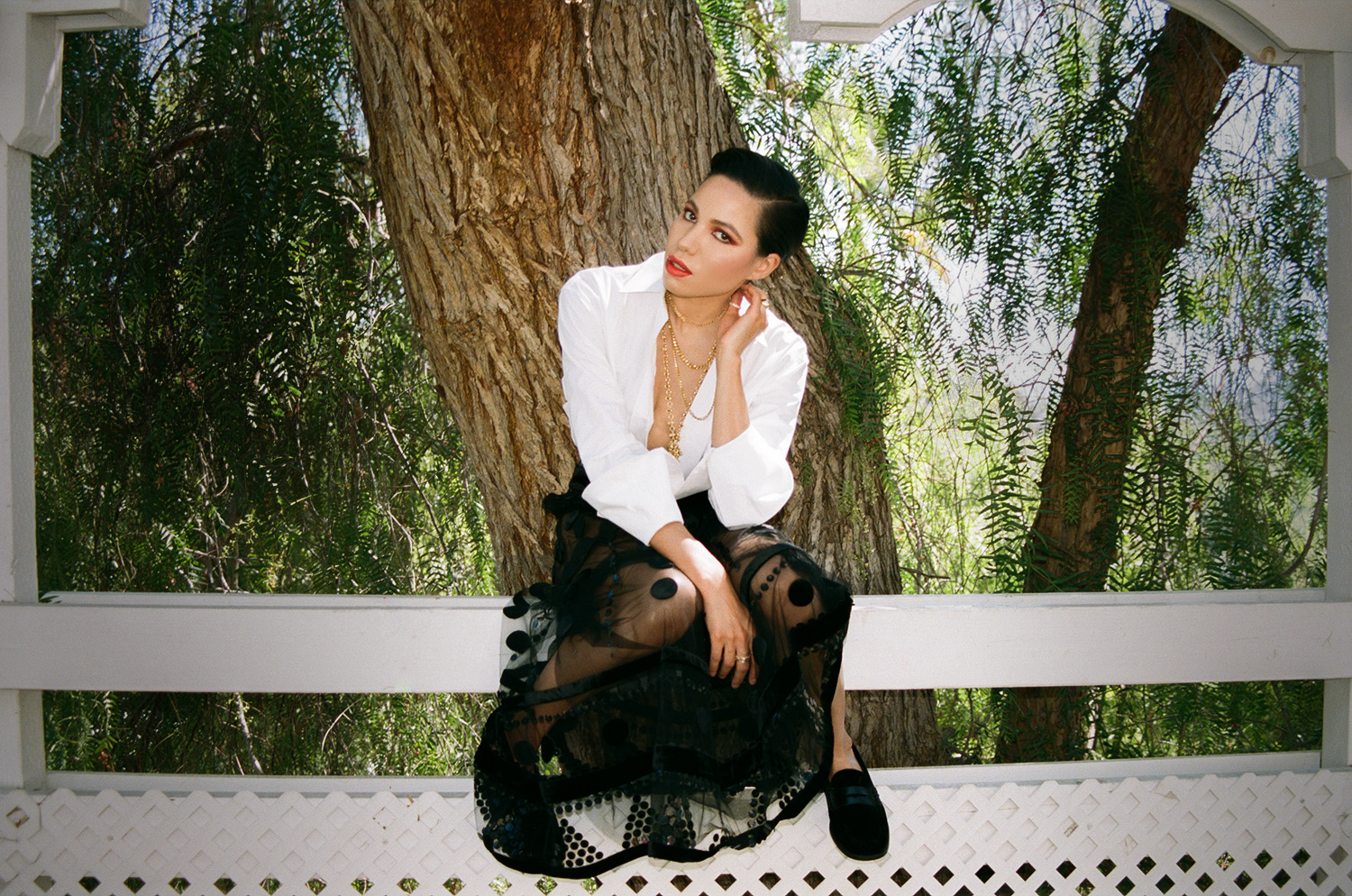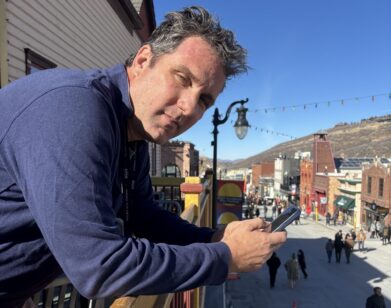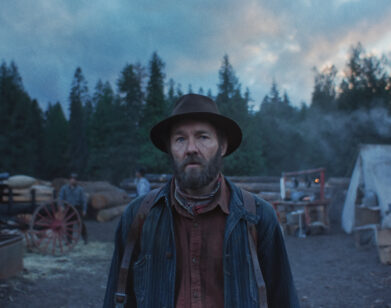in conversation
Jurnee Smollett and Samuel L. Jackson on Lovecraft Country, Blood Memory, and the Two Pandemics We’re Fighting

Shirt and Sweater (worn around waist) by Valentino. Briefs by Chantelle. Chain Necklaces and Bracelets by Ellie Vail. Long Necklace by Shay Jewelry. Rings by Emili. Shoes by Sebago.
The last time Jurnee Smollett teamed up with the showrunner Misha Green, they confronted the horrors of Antebellum Georgia with the historical drama Underground. That series, which aired on WGN, told the story of a group of enslaved people who escaped their plantation via the underground railroad. And although Underground lasted just two seasons, Green already had her next project in the works, and she brought Smollett along with her. Lovecraft Country picks up where Underground left off, sort of. The new Jordan Peele– and J.J. Abrams–produced HBO horror fantasy also charts the dangers of being Black in America, this time in the Jim Crow South. But as its title—a reference to the horror writer H. P. Lovecraft—suggests, the malevolence in Green’s new show erupts into the supernatural. Smollett, who has appeared in films such as The Great Debaters and Birds of Prey, plays Letitia “Leti” Lewis, a free spirit whose camera is always handy and whose backstory remains a mystery. In the pilot episode, which aired last Sunday, Leti joins her childhood friend Atticus Black (Jonathan Majors) and his uncle George (Courtney B. Vance) on a road trip across the south, where the real threats are not so much the vampire-werewolf beasts trying to kill them—although those do exist—as they are racist white folks, also trying to kill them. As Smollett tells her friend, the actor Samuel L. Jackson, with whom she co-starred in the 1997 drama Eve’s Bayou, this was the role that kept her up at night. —BEN BARNA
———
SAMUEL L. JACKSON: How are you today? I just saw a picture of you on Instagram, and you were all dressed up. I said, “Am I supposed to be dressed? Isn’t this a phone call?”
JURNEE SMOLLETT: I’m having fun getting dressed just to go to my living room.
JACKSON: Oh, is that what’s going on?
SMOLLETT: For a month, I’ve been in sweats and a white T-shirt.
JACKSON: You had that all-over-the-world junket last year. You don’t need to go nowhere. You’re good. You’d be overexposed.
SMOLLETT: Yeah, we don’t want that.
JACKSON: I watched the first episode of Lovecraft Country, which is great. Each episode has its own standalone theme, right?
SMOLLETT: Misha [Green], the creator, has a gift for maintaining varying degrees of tone. It’s definitely a wild ride we go on, but I wouldn’t say each episode is a standalone. I can’t wait for you to see the whole season. Lovecraft deconstructs the classic horror story and then flips it on its head. It’s a radical way of retelling it and centering Black voices in it, which for me was so exciting, because I’ve always felt shut out of the genre and I love the genre.
JACKSON: We all grew up watching something that made us scream, jump, shout, whatever. Especially as actors, you always want to say to yourself, “I wonder how I would react in this environment. Put me in this environment. Let me see what I’ll do. Let me run from something with big teeth or somebody with a big ax.” That’s why I jumped at the chance to do Deep Blue Sea. [The director] Renny Harlin said, “Well, you’re dying first.” I was like, “What? Why are you killing the brother first?” He said, “It’s not the brother. You’re the most famous person in the movie, so if we kill you first, it means anybody can die.” I was like, “Oh, okay, fine.” That appealed to me.
SMOLLETT: Yeah, that’s different. I was never offered the you’re-the-most-famous role. I was offered the you’re-the-Black-chick-let’s-kill-you-off role, which is why I’ve not really done much in this genre.
JACKSON: It’s not like there’s a lot of it out there, unless you’re doing one of those things where people go to summer camp, or where they go to the cabin and do the dumb things.
SMOLLETT: It’s because there just hasn’t been enough of us behind the camera telling the stories, frankly.
JACKSON: Which leads me to this whole other thing. Out of all the things I didn’t know, I found out that Lovecraft was this racist dude.
SMOLLETT: Not many people have read his essay On the Creation of Niggers. It’s not widely passed around.
JACKSON: How did this project come to you? Did somebody just call you?
SMOLLETT: [Misha Green’s previous series starring Smollett] Underground had just been canceled. Misha was working on this with Jordan [Peele] and J.J. [Abrams], so I knew about it. She passed me the script casually, like, “Hey, this is what I’m working on.” But it wasn’t in a way of, “Hey, I’d like you to come and do this with me.” When I read it, when I read the character of Leti, this buoyant woman who’s a bit of a tornado when she comes into town, and who’s got this reputation for being a disruptor, I was so drawn to her in a way that my body was alive reading it. I don’t read things that often where I’m like, “I have to be a part of this.” But I was obsessed with this character, to the point that I was losing sleep over why Misha hadn’t actually offered me the role.
JACKSON: Was that because it wasn’t the time to offer anybody the role, or they were seeing other people?
SMOLLETT: It wasn’t yet time to offer anyone the role. It was early in the development. But still, I was getting offers for other projects and fielding them to Misha. And she kept saying, “No, you can’t do that. You need to just go and do a film.” She wasn’t saying, “You need to just come and do Lovecraft.” It wasn’t until maybe five months later that I was in J.J.’s office at Bad Robot about something else, and he said to me, “Hey, you read the Lovecraft Country script?” And I said, “Yeah, man. Fuck, Misha’s writing is so incredible. I miss it.” And he said, “You should do it.” I was like, “Hell yeah, I should do it! But she hasn’t even talked to me about it. I’m freaking out.” He just calmly responded and said, “You should do it.” And I was like, “Dude, the fuck! You don’t need to convince me that I need to do it. I agree!” A few weeks later, Misha called me very calmly and said, “We just hired this director, Yann Demange. I want you to sit down with him,” and then got off the phone. So I went and met with him, and then they offered it to me.
JACKSON: What’s the process been like for you since Eve’s Bayou? What’s been your journey through the system as a Black woman? Coming through the “Hollywood food machine,” as I referred to it at some point, chews you up and spits you out. Some people get digested and become a part of the energy and lifeblood of it, and some people get spit out. So what happened?
SMOLLETT: There was a period when I wanted to quit. When we were working with the non-profit that we were all on the board of, Artists for a New South Africa, I felt that my calling was more in the activist world, and I thought maybe I should just quit acting because I was so frustrated. Having grown up in it, I was already a little jaded about the industry at the very ripe age of 20. As a Black woman, the data’s there. The stats are abysmal—behind the camera, in front of the camera, green-lighting films, we’ve got so much work to do to level the playing field for Black women, brown women, women of color in general. I honestly didn’t think it was for me anymore. I have to say, I don’t know if I’ve ever outwardly said this to you all, but that trip that you all took me on to South Africa…
JACKSON: To KwaZulu-Natal?
SMOLLETT: Yes. I’ll never forget your wife calling me with Alfre [Woodard] and Sharon [Gelman] and being like, “We’re going on this delegation, and we can’t leave you. You’re coming.” I was like, “I would love to come, but I’m broke.” And all you all chipped in and paid for me to come. The impact that trip has had on me has been life-changing for a number of reasons. I saw the power that art has to influence culture. Watching you and everyone else on that trip, it was your art that got you there, and it could travel beyond borders. It could travel overseas, across the pond, and touch people’s lives. It dawned on me that if I was given some sort of gift, how dare I not use it. And then, when I came back from that trip, I was sent the script for The Great Debaters, the movie Denzel [Washington] directed. I landed in New York and changed my flight, because I was supposed to go back to L.A., and stayed there so I could research the Great Debaters at the Schomburg library in Harlem. I stayed there for a month and a half researching the film. Doing that film was like taking a masterclass. I think of you and Denzel as some of our greatest actors of all time. But I needed to be reminded of why I was doing it, why I loved it. I’m not going to say it’s been easy. It’s been fucking challenging because there aren’t many Misha Greens writing really complex characters like Leti. But I love it. It’s why I’m still doing it. I cannot not do it.

Shirt and Skirt by Valentino.
JACKSON: I say, “You choose that thing that you want to get up every day and go do.” It’s very important that you want to go do it every day. You met Mr. Mandela on that trip, right? How was that?
SMOLLETT: I remember the feeling of his presence when he walked into the room. I grew up reading his autobiography, Long Walk to Freedom, and hearing stories of this man. And then, when he walked into the room, and when I sat down next to him and held his hand, it was so soft, and all I could think was, “This is an ordinary man. He’s flesh and blood just like you and I, and yet he’s done such extraordinary things.” There was such power in that to me. We sometimes put leaders on pedestals. It’s important to remember to not do that, because it creates a distance between what we aspire to be and what we can be. There’s a danger in that, I think, in our generation. It’s important to take these important figures, these human beings, off the wall. They’re not museum artifacts. They’re actual people who are brave, who are afraid, who are courageous, who are disruptors. But they’re just flesh and blood.
JACKSON: I never tried to make you think that we were special, even when we were there on Eve’s Bayou, doing all the stuff we were doing. It was more about establishing a great relationship between the two of us and saying, “Okay, now let’s go and have some fun and enjoy it.” We’re not special because we do this. We just have a great job, a better job than most people’s jobs. What have you seen change since Eve’s Bayou? What has changed for you over time, including how you navigate your way in this business?
SMOLLETT: I shed my girlhood, obviously. I’m a mother. It’s like what Meisner talks about: The foundation of acting is the reality of doing. I grew up doing. It’s how I learned. I learned from you. I learned from Alfre or Denzel—this village. I’m encouraged now, because I’m seeing such a shift in the industry, particularly in the stories that are being told, the access to opportunities. I’m encouraged because there are so many people who aren’t waiting any longer for permission to create art. We have been limited so much to that straight, cis, white male gaze. They’ve held the keys to the castle for so long. What excites me and encourages me is to see that game expanded, and to see the spirit of disruption in the industry. When you expect someone to make a right, they make a left. To see genres being broken open, like the sci-fi, horror, and thriller genres, it excites me. I think art has the power to shift culture. You can’t shift policy or politics—our gutless leaders can’t fall—without first shifting culture.
JACKSON: Speaking of that culture shift, how are you feeling about the state of the country post–George Floyd? I grew up in the ’60s, so I had my moment of being out there and trying to be a factor for change and being a voice. I still maybe talk too much, but who knows? It’s never too much.
SMOLLETT: I love your rants on Twitter! They are epic.
JACKSON: I try not to do it as often as I used to. Some days, I just get fed up and I can’t help it. What will be the legacy you leave for people to watch? I have a whole other thought about what I do and how I do it and why I do it, because my life is one thing, and my work life is a whole other thing. I might do a film that’s culturally relevant, but mostly I’m doing popcorn and entertainment. I’m doing escapism. I don’t feel the need to do films that are poignant in that way sometimes.
SMOLLETT: Come on now, you still do.
JACKSON: Shaft ain’t poignant. Shaft’s just fun.
SMOLLETT: But your body of work has contributed already. Damn, Sam.
JACKSON: So how do you feel about what’s going on and where you are trying to go in terms of what your career is going to mean?
SMOLLETT: We’re fighting two pandemics right now. It’s a very sobering time to be alive, and yet I’m filled with a lot of hope. My first time leaving the house to go somewhere that wasn’t the grocery store was this meeting in a church basement that Black Lives Matter was organizing. It was a small meeting. Dr. Melina Abdullah and Janaya Future Khan spoke. So many folks were there. And since then, I’ve gone and participated in some of the protests. There’s so much work to do, and I wrestle with being pessimistic versus being very optimistic. By nature, I’m an optimist. I believe in justice and truth and hope in the world. I do think hope is very audacious. I do think it’s a radical act to find your joy in this time. But I can’t help but feel that we as a society, especially as a nation, walk in circles. Emmett Till is Trayvon Martin, okay? The systemic racism that this nation has been built upon has yet to be dismantled. When we tell stories like Lovecraft Country, people say, “It’s so relevant, it’s so timely.” Well, name me a time since 1619 that it wouldn’t be relevant. This story is ancestral. Our heroes are going on a quest to bring down white supremacy. Yet as Black Americans, we’re still trying to bring down white supremacy as well as the patriarchy, because the patriarchy benefits from white supremacy and white supremacy benefits from the patriarchy. I’m hopeful because the spirit of disruption is strong. Folks are so fed up, and they’re sick and tired of being fed up. We’ve got to keep the foot to the gas pedal, because we tend to walk in circles as a nation.
JACKSON: Well, the foot’s been to the gas pedal, but watching Lovecraft or going on Instagram and looking at somebody’s feed where they got pulled over by a cop, it’s almost like nothing changed. Time seems to stand still sometimes.
SMOLLETT: How do you feel now watching all of this? Does it feel that it’s more blatant than ever, or does it feel more subliminal?
JACKSON: It’s as blatant as it was when I was a child and I’m fucking 71 years old. It’s like, “Wait a fucking minute. How long are we going to be doing this?” [Black] people talk about having a talk with their kids about how to act when leaving home or how to interact with the police. It’s the same conversation that’s been going on for me for 70-some fucking years. It ain’t changed.
SMOLLETT: I remember my parents sitting down and having that talk with my oldest brother Jojo in 1992, when the Rodney King situation happened. I clearly remember my parents sitting him down and saying, “You just got your learner’s permit. You’ll be driving, while Black, with your siblings in the car.” I hope the world is different, but it’s not lost upon me that I will most likely have to have that talk with my son, too.
JACKSON: You would hope not, but there’s nothing that says that you won’t. And now, we’ve got a person who does things, and you can look at him and say, “Wow, that’s fucked up,” and he’ll turn right around and say, “I didn’t do that.” And you’re like, “I saw you do it. We actually have it recorded.” And he says, “No, you edited that. You’ve changed it. Are you going to believe me or your lying eyes?” It comes down to that bullshit again.
SMOLLETT: On the other hand, I do feel like there is a great reckoning happening. I do feel that there are those of us who are like, “Not on our watch. We’re going to reclaim what’s ours.” The success of this movement will heavily depend upon our imaginations, because what this movement is doing is inviting us to imagine a world in which we actually have a community-led initiative instead of policing. Imagine a world that looks different than what we’ve known this world to be. How big can we all dream? We’ll see. But regardless of generation, gender, or whatever, it’s that blood memory. One of my teachers talks all the time about the blood memory that flows through my veins, this visceral, ancestral connection to the oppression of my people. You have blood memory, too.
JACKSON: Of course.
SMOLLETT: When I curfewed in June, I thought back to being curfewed in 1992. Rodney King survived that beating, but it ruined his life. George Floyd didn’t survive.
JACKSON: Right. There’s still Emmett Tills. We continue to have generational Emmett Tills. It just doesn’t cease.
SMOLLETT: When the fuck are they going to arrest Breonna Taylor’s murderers? When the fuck is that going to happen? Anyone?

Shirt and Skirt by Valentino.

Shirt by Saint Laurent By Anthony Vaccarello. Necklaces by Ellie Vail.






